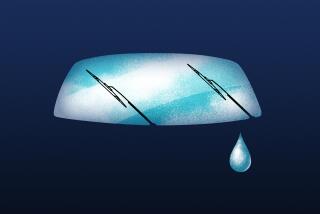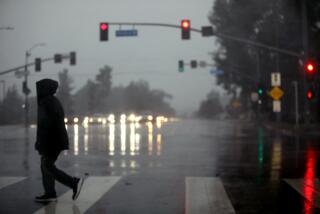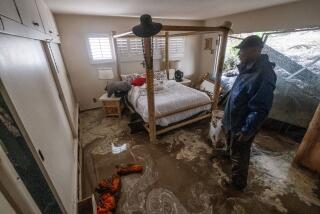After Hurricane Harvey, a family throws away their past, piece by moldy piece
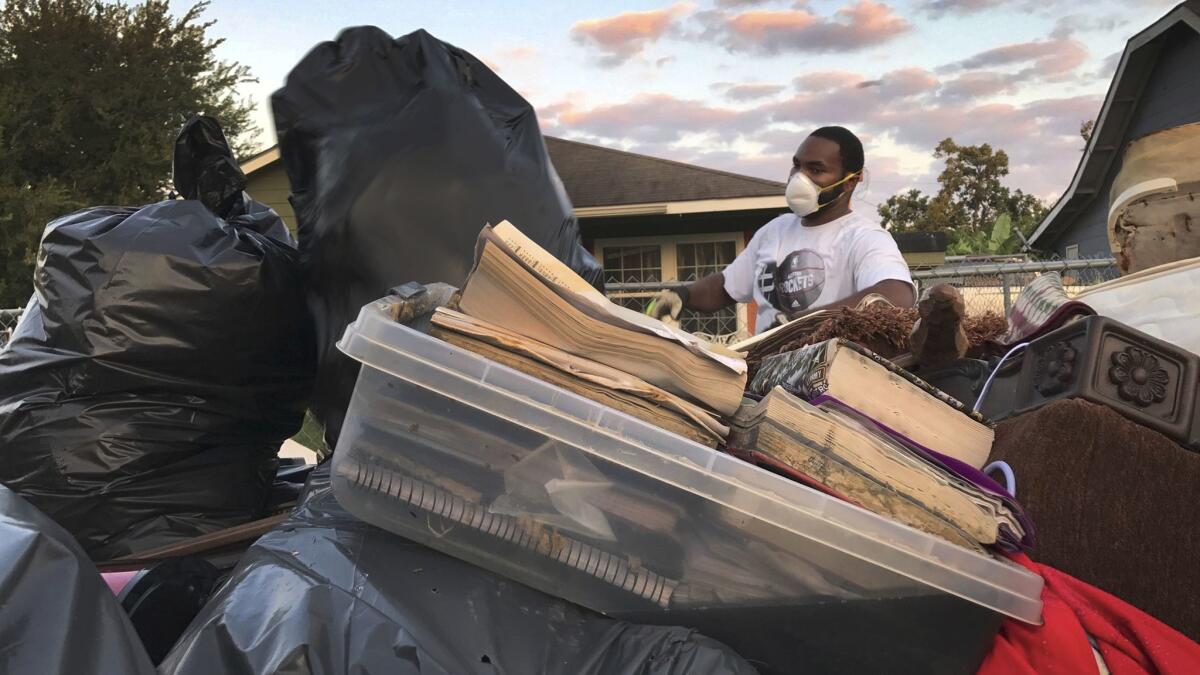
The past piled up on the side of the road, stuffed into black trash bags stacked on top of soggy furniture and moldy mattresses.
There was the still-crisp blue blazer and dress — with matching purse — that Corinth Williams got her grandmother for her birthday in July. Mold had crept into the sleeves. There was the dog figurine with puppies attached to its back. When Williams was a child, she used to play with it and break off each of the small dogs. Her grandmother, Evelyne Bowie, repaired it more times than she could remember.
There would be no fixing it this time.
There was mold everywhere in Bowie’s house, which meant most everything had to go. Williams, 28, carefully considered the familiar items from her childhood memories of visiting Bowie and the things her grandmother cherished. That fruit centerpiece that graced the dinner table? Gone. The plant her grandmother got the day Williams was born — its stringy limbs now stripped of leaves and yellowed from disease?
She took it out to the curb, but not before severing a limb.
“I’m going to try and replant it and grow it,” she said. “This plant is as old as me.”
Down the street in badly hit Port Arthur, neighbors were doing the same thing. Wearing masks and gloves, they created snowdrift-like heaps of trash, throwing away things that marked moments in their lives.
It’s the ritual of disaster, and it’s playing out in Texas, Florida and other places where Hurricanes Harvey and Irma blew through and left millions of residents sorting through their stuff — and often tossing it away. It may look like only a clock or a pair of shoes or a dresser to the insurance adjusters fanning out across the disaster zones. But the personal act of going through a house and discarding something of sentimental value feels like permanently detaching memories from their moorings.
The work had begun early for the Williams family at Bowie’s house. Under unseasonably cool weather and a light breeze, Steven Williams, Corinth Williams’ husband, walked through the doorway of the two-bedroom, two-bathroom home and scanned the living room. His mother, Maxine Williams, had come to help and already had her surgical mask and gloves on. He strapped his mask on over his beard, and the two went to work in the bedrooms. The stench of dank air was unavoidable.
Maxine Williams, a former state worker and now the pastor at Grace Church of the Nazarene, wasn’t one to linger on a job. She slid the window open and out flew a drawer. Then another.
“I like throwing things,” she said. “It feels therapeutic.”
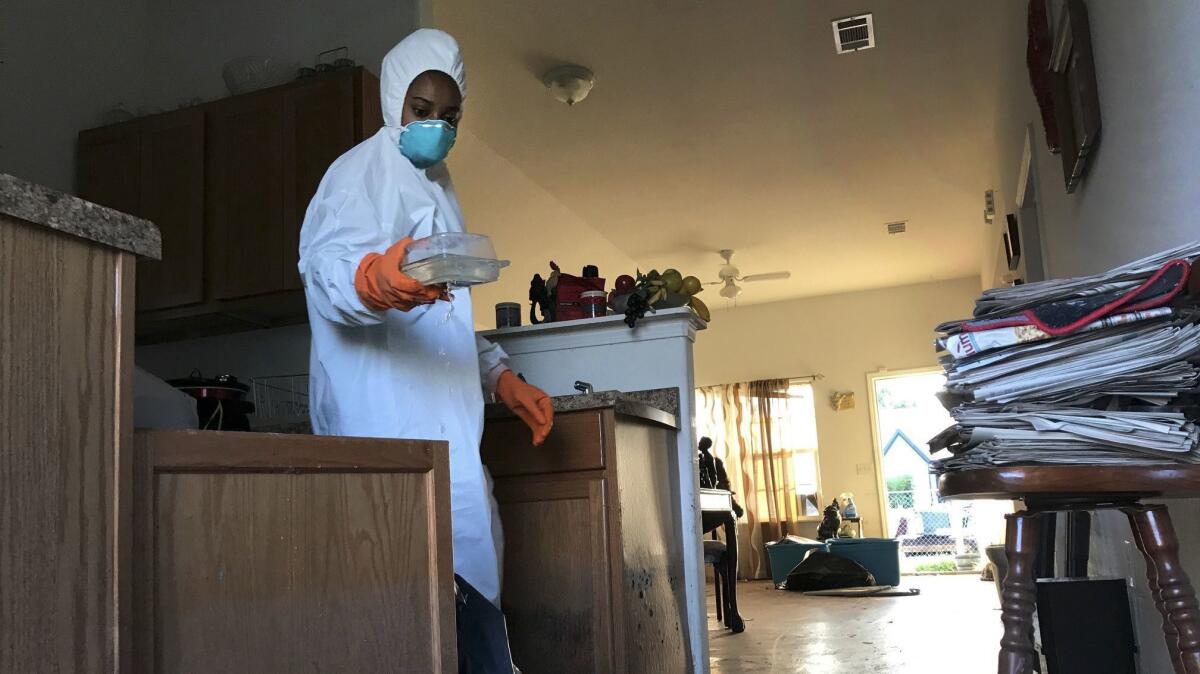
She was able to help clean Bowie’s house because she’d already hollowed out hers a few days earlier. Filling a trash bag from a closet, she recalled her own escape from Port Arthur — a harrowing affair.
For her, salvation arrived on a jet ski.
Williams said she climbed aboard — along with her dog and small bag — and was ferried to safety a few miles away. It was her first time on a jet ski, and she said the ride felt like an eternity.
As she continued cleaning, her son came across a container filled with books on radiology Corinth Williams had studied on her way to becoming an X-ray technician in Beaumont. Since the floodwaters receded, she was back at work, starting her shift at 7:30 a.m. The books were heavy with water.
A love seat was dragged across the warped, wooden floor with puddles of water still on it. Corinth Williams’ grandmother liked that chair.
Bowie had been in her house with Steven and Corinth Williams, who had come to be with her as the waters rose amid the seemingly endless rainfall. It had edged up over the electrical sockets and up to the windows. The water line where it had finally stopped was marked by black mold along the walls.
He remembered the snakes that were stuck in the screen door, trying to slither inside. The 34-year-old registered nurse had waded out into the frontyard and flagged down a boat with almost a dozen people huddled aboard. He and Corinth carried her grandma to the boat — passing a snake perched on a white cross that was almost submerged in the yard. Several homes had crosses in their yard — symbols of faith often seen in the South.
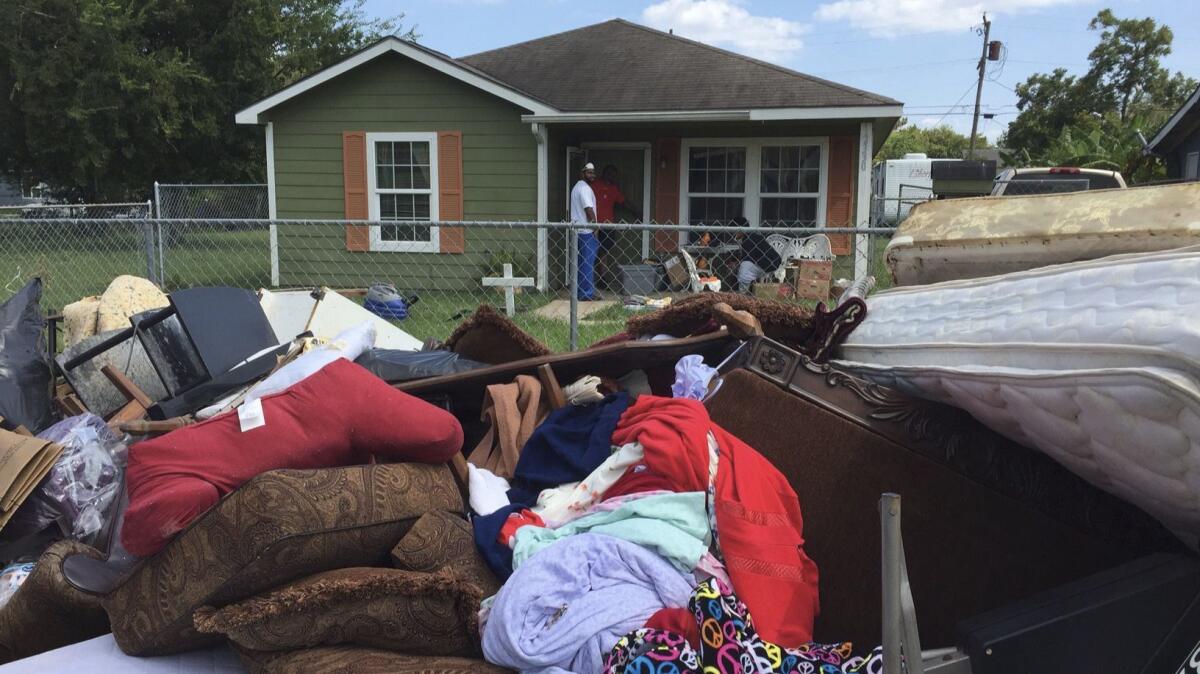
“I just left him alone,” Steven Williams said, pointing at the cross, standing in the yard amid the still green but saturated grass. “He was just trying to make his way too.”
It seemed as though every possession Corinth Williams picked up had a story attached to it. There were the postcards from Belize they mailed to Bowie from their honeymoon five years ago. Her husband carried out a pot filled with a chicken noodle soup Corinth had made the night they evacuated. It had gone untouched.
“I figured we would need to eat something,” she said. “But nobody was very hungry that night.”
Her feet squished on the bedroom carpet, brown and matted like wet fur. She found a large Bible, its white cover turned tan and grimy. She opened it and found the obituary for her uncle. Carrying it carefully, she put it on the porch — unsure whether it could be saved.
It was the kind of calculation she found herself making as the day wore on. Maybe if they boiled stuff, it could get rid of the contaminates. It wasn’t just mold that was in the water, Maxine Williams warned. Port Arthur is home to chemical and gas plants. Mold spores had been growing and spreading for days. It wasn’t worth the risk.
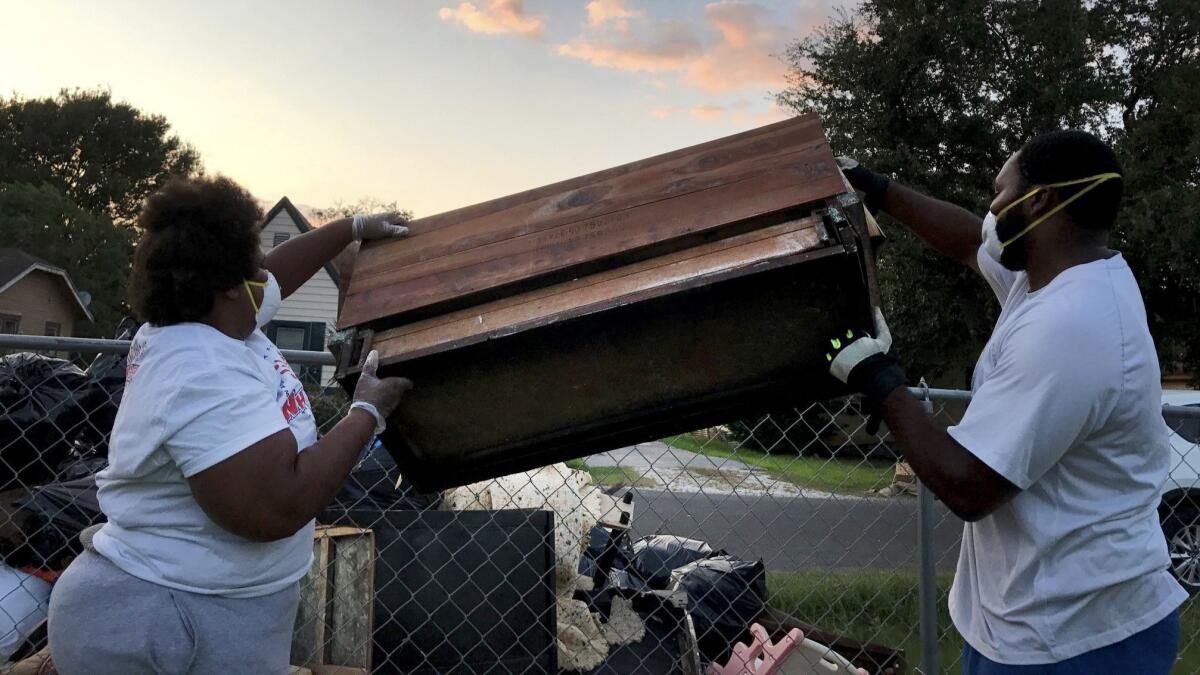
Steven and Corinth Williams were living at the church after their own home was washed out by the flooding. They had been in the process of getting a new house, and many of their things were kept at Bowie’s when Harvey hit.
She found their wedding china in Bowie’s closet, sitting in mushy boxes. She opened one, the cardboard tearing away like wet bread. To her relief, the china was still wrapped in plastic bags.
Corinth, dressed in her white protective suit, carried the china to put in the back of the pickup truck. She lamented the loss of so many things. Her mother had died when Corinth was 22, and she’d lived with her grandmother until she got married. She looked around the house and saw a lamp Bowie bought decades ago — still with the protective plastic on the shade and the price tag of $16.97 stuck to the side.
“She put that on layaway because it was too expensive at the time,” Corinth Williams said. She would try and save the lamp.
Steven Williams had been asked by Bowie about the $400 in quarters she’d also saved in her house. As the afternoon faded into evening, he came across a heavy bag and thought he’d found the quarters.
Ripping into the bags, it was something seemingly heavier and far less valuable; old, wet phone books.
He came across prescription bottles stored in plastic bags. Bowie followed instructions and wouldn’t discard them in the trash for fear of someone stealing her information.
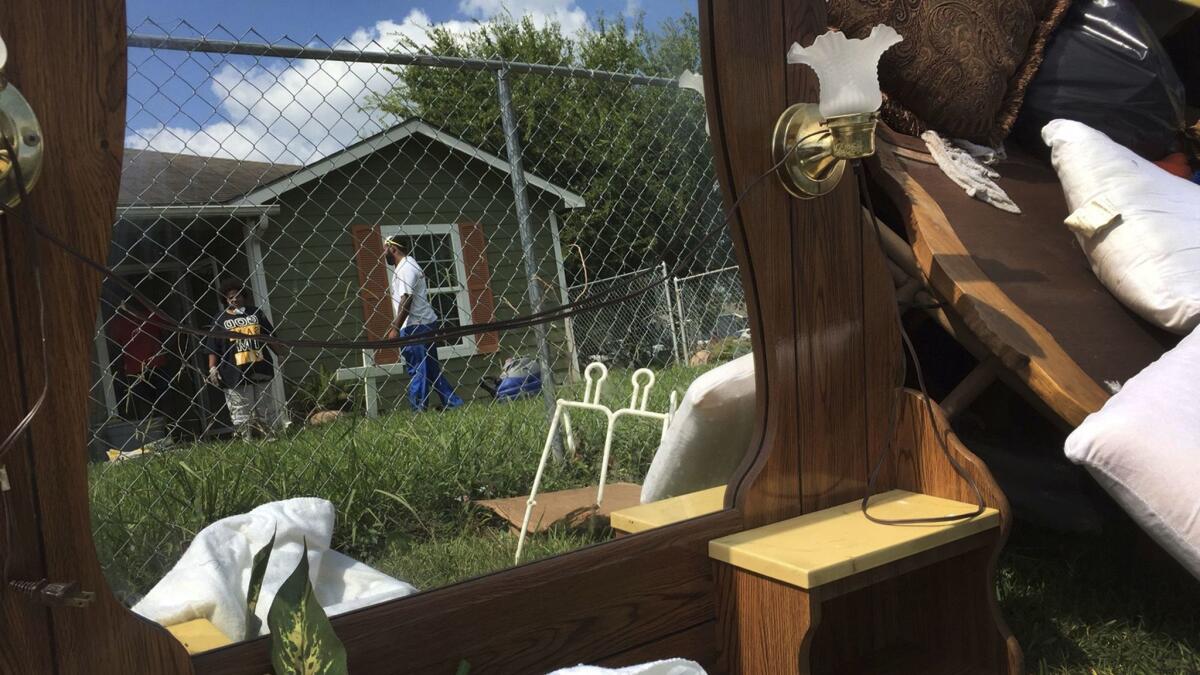
He found a dark trash bag and shoved them in. Then he hoisted the bag over the chain-link fence, where it settled with a dozen other bags. Williams then helped Maxine Williams carry a hope chest that seemed to disintegrate with each step toward the curb.
Corinth Williams found herself wanting, but unable, to save more. The black clock hanging on Bowie’s wall was one her grandmother loved. They’d spent months trying to find the right one before settling on it. The familiar cuckoo clocks on an adjacent wall probably wouldn’t make it.
Neither would the piano.
It sat along the wall, the wood faded and soft. Mold already etched itself into the crevices. The off-white keys were still labeled — C, D, E, F and G — with small paper tabs. Corinth Williams was a child when she would practice on it with her grandmother. The C key was struck and it managed to make a lonely sound in the nearly empty room.
Out in the darkness, the last of the sodden carpet in the bedroom had been thrown onto the trash heap. Same with a television where Bowie used to watch the Oprah Winfrey Network.
The piano wouldn’t be moved out today. It had gotten too late. Maxine Williams turned out the lights, leaving the house in the dark and inside out.
Twitter: @davemontero
ALSO
Hurricane Maria strengthens into a Category 3 storm as it nears already battered Caribbean
Still reeling from Irma, U.S. Virgin Islanders scramble to evacuate ahead of another hurricane
In Irma-devastated Virgin Islands, resolve blends with worry of being forgotten
More to Read
Start your day right
Sign up for Essential California for news, features and recommendations from the L.A. Times and beyond in your inbox six days a week.
You may occasionally receive promotional content from the Los Angeles Times.
